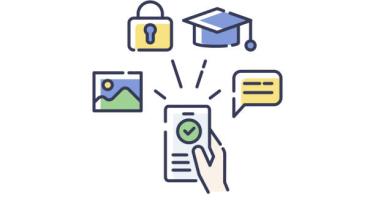Principal's Blog; Our Pro-D Day on Nurturing Digital Literacy

Our Pro-D day on Nurturing Digital Literacy; Ensuring Safe, Caring and Inclusive Environments
Dear Parents,
As the principal of JV Humphries, I am deeply committed to the well-being and academic success of all our students. In today's digital age, technology plays a significant role in our daily lives, presenting both opportunities and challenges for our children. As we navigate this landscape together, it's essential to establish clear boundaries and promote responsible digital citizenship among our students.
We understand that as parents, you play a crucial role in shaping your child's attitudes and behaviors towards technology. Your guidance and involvement are invaluable in helping them develop the skills and habits necessary to navigate the digital world safely and responsibly. Therefore, it's essential to engage in open and honest conversations with your child about their digital experiences, concerns, and questions.
At JVH, we recognize the importance of collaboration between parents and educators in promoting digital literacy and online safety. Our teachers are dedicated to integrating digital citizenship education into the curriculum at all grade levels, ensuring that students receive the necessary knowledge and skills to make informed decisions online. Through interactive lessons, discussions, and real-life scenarios, we aim to empower students to become responsible digital citizens.
As parents and educators, we share a common goal: to foster a safe and supportive environment where our students can thrive both online and offline. To achieve this, we must work together to establish clear guidelines and boundaries around digital usage. While technology offers many benefits, it's essential to set limits to prevent excessive screen time and mitigate potential risks. Just this past Friday at our Professional Development Day, the staff spent an entire morning learning more about safety, etiquette, and the perils of students in digital spaces. We learned a number of things that we hope will add to students’ safety and good conduct in the virtual world.
To support you in this endeavor, we offer the following guidelines for managing your child's digital usage:
1. Open Communication: Foster open and ongoing communication with your child about their online activities, experiences, and concerns. Encourage them to come to you with any questions or issues they may encounter online.
2. Establish Clear Rules: Set clear guidelines and expectations for your child's digital usage, including screen time limits, appropriate websites and apps, and rules for social media usage.
3. Lead by Example: Model responsible digital behavior for your child by demonstrating healthy screen habits, respectful online communication, and critical thinking skills.
4. Monitor and Supervise: Keep an eye on your child's online activities and interactions, especially during their formative years. Use parental control tools and monitoring software to help you stay informed.
5. Encourage Offline Activities: Balance your child's digital usage with offline activities, such as reading, playing outdoors, or engaging in hobbies and interests that don't involve screens.
6. Educate About Online Safety: Teach your child about the potential risks and dangers of the internet, including cyberbullying, online predators, and scams. Empower them to recognize and respond appropriately to these threats.
7. Stay Informed: Stay up-to-date on the latest trends and developments in technology and online safety. Educate yourself about the apps, websites, and social media platforms your child is using.
As you may have heard, in September there will be new Provincial regulations around students’ cell phone use in BC Public Schools. At this point it’s not clear what those regulations will contain, but at a recent Ministry presentation I attended the objectives were laid out:
- To reduce distractions, interruptions and impacts to learning
- To protect students from online bullying and social media related harms
- To protect students and families from peer pressure to have phones
- To support students’ mental health, wellbeing and promote digital literacy. (MOECC Presentation to BCPVPA Chapter Council, Feb 2024)
We anticipate hearing from the Ministry about policy directions in the spring, and as soon as we know what they look like we’ll pass that on to you.
By working together as partners in your child's education, we can help them develop the skills, knowledge, and resilience they need to navigate the digital world safely and responsibly. Let's continue to collaborate and support one another in promoting digital literacy and online safety for all our students, from kindergarten through grade 12.
Thank you for your ongoing support and partnership.

